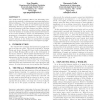Free Online Productivity Tools
i2Speak
i2Symbol
i2OCR
iTex2Img
iWeb2Print
iWeb2Shot
i2Type
iPdf2Split
iPdf2Merge
i2Bopomofo
i2Arabic
i2Style
i2Image
i2PDF
iLatex2Rtf
Sci2ools
ICAIL
2007
ACM
2007
ACM
P2P systems in legal networks: another "small world" case
The “small world”-paradigm offers a new interesting viewpoint for the analysis of contemporary legal networks and artificial intelligence. This topological approach sheds further light on such different fields as case-based legal reasoning, knowledge discovery in legal databases, or legal ontologies, as far as clustering coefficients, diameter and hubs of the network are involved. Moreover, empirical evidence shows that even P2P systems as Gnutella present small world-features. So it becomes possible to deepen our understanding of how spontaneous communities organize themselves in the network. While opening new horizons in the field of recommender systems, it also widens our perspective in dealing with such important issues as privacy and digital copyright.
Artificial Intelligence | Case-based Legal Reasoning | Contemporary Legal Networks | ICAIL 2007 | Legal |
| Added | 19 Oct 2010 |
| Updated | 19 Oct 2010 |
| Type | Conference |
| Year | 2007 |
| Where | ICAIL |
| Authors | Ugo Pagallo, Giancarlo Ruffo |
Comments (0)

